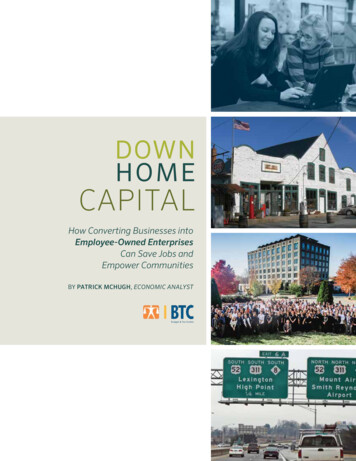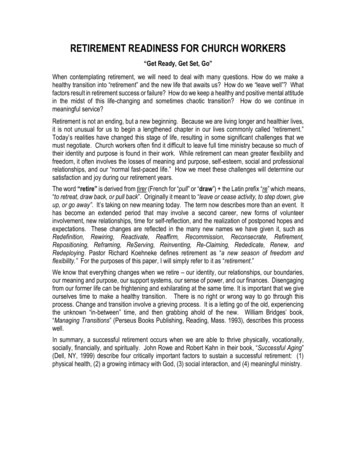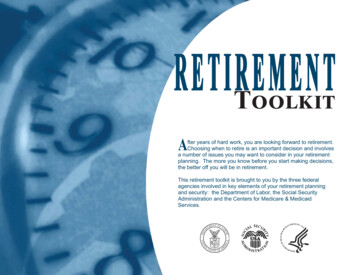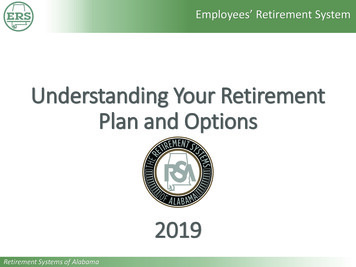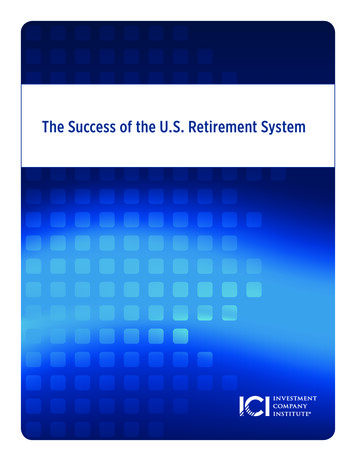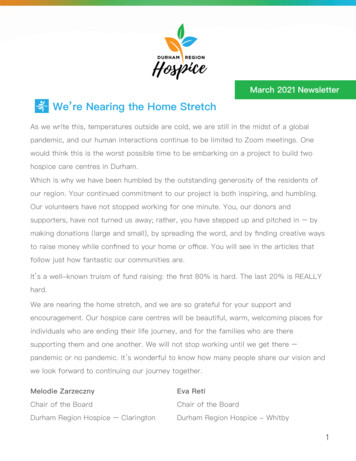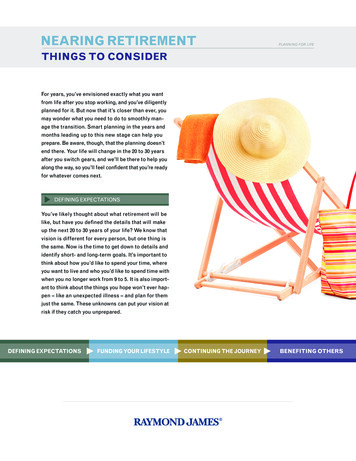
Transcription
NEARING RETIREMENTPLANNING FOR LIFETHINGS TO CONSIDERFor years, you’ve envisioned exactly what you wantfrom life after you stop working, and you’ve diligentlyplanned for it. But now that it’s closer than ever, youmay wonder what you need to do to smoothly manage the transition. Smart planning in the years andmonths leading up to this new stage can help youprepare. Be aware, though, that the planning doesn’tend there. Your life will change in the 20 to 30 yearsafter you switch gears, and we’ll be there to help youalong the way, so you’ll feel confident that you’re readyfor whatever comes next.DEFINING EXPECTATIONSYou’ve likely thought about what retirement will belike, but have you defined the details that will makeup the next 20 to 30 years of your life? We know thatvision is different for every person, but one thing isthe same. Now is the time to get down to details andidentify short- and long-term goals. It’s important tothink about how you’d like to spend your time, whereyou want to live and who you’d like to spend time withwhen you no longer work from 9 to 5. It is also important to think about the things you hope won’t ever happen – like an unexpected illness – and plan for themjust the same. These unknowns can put your vision atrisk if they catch you unprepared.DEFINING EXPECTATIONSFUNDING YOUR LIFESTYLECONTINUING THE JOURNEYBENEFITING OTHERS
NEARING RETIREMENTPLANNING FOR LIFEHAVE YOU THOUGHT ABOUT Now that you’re on the verge of this transition, you may wonder:1.How can I make sure my money will last in retirement?2. Have I saved enough for a secure and comfortable retirement?3. Will my everyday expenses be covered? What about my wants?4. Should I keep working? Do I want to?5. What risks do I face?6. How will I pay for healthcare expenses?7. How can I maximize my household Social Security benefits?8. How much should I reserve for emergencies?9. Have I properly documented my estate-planning wishes?10. How should I allocate my assets as I get older?Identify your goals. Write down your short- andlong-term goals and review them with your advisorto determine how to best achieve them and in whatCOMMON GOALStime frame. Do you want to retire early? Buy a vacation home? Are your goals realistic? Talk with youradvisor to figure out where you may have to makeadjustments as you work toward your vision.Think about where you want to live and the costsassociated with transportation, insurance, taxes andmaintenance. Will you need a car? Is there access topublic or other transportation?Think about how you’ll spend your days to keepyourself physically, emotionally and mentally engaged.Will you continue to work part time? Volunteer? HelpLife in retirement should belong and fruitful. Along theway, you may have other goalsto plan for, as well:New car or boatTravelFunding educationLeaving a legacyBenefiting otherswith family? Travel? Will you be obligated to babysitthe grandkids? Be realistic about what to expect, thencarefully address these issues so you’ll know howto meet your obligations to yourself and your family.TIPDon’t forget your social life. Retirement is a prime time to cultivate newfriendships and hobbies, while maintaining older friendships. If you’ll have totravel to meet up with friends and family, factor that in.2
NEARING RETIREMENTPLANNING FOR LIFEARE YOU EMOTIONALLY READY?Preparing mentally and emotionally is just as important as preparing financially.You’ll likely go through several emotional stages as you adjust to your new lifestyle.The planning phase – Your entire career has been spent saving and planning for retirement.The big day – Retirement day is here. Celebration ensues.H oneymoon phase – After the handshakes and hugs, you and your spouse will throw yourselfinto your new life, enjoying all the things you didn’t have time for before.Disenchantment – The emotional high wears off, and you may start feeling bored or disillusioned.R eadjusting – A time for creating a new identity, separate from who you were as a professional.Familiarize yourself with your new circumstances and learn to navigate your lives as a full-timepartnership now that you and your spouse are spending more time together.Moving on – Settle into a new daily routine, on your terms.FUNDING YOUR LIFESTYLENext comes the big question: How will you pay for it all? You’ll need to structure a dependableincome stream so you’ll feel confident that your money will last as long as you need it to.Determine living expenses. Now that you have outlined your goals, determine what you needand what you want so that you can make adjustments as you plan. Consider housing, transportation, food, entertainment, clothing, healthcare, travel and the miscellaneous items that makelife more fulfilling. If you need that country club membership, factor it in.Identify your cash streams. There’s reliable income from sources like Social Security, annuities,pensions and employment; and other supplemental sources that can fluctuate, like required minimum distributions, income from rental properties, brokerage and retirement accounts, and savings.Determine how these assets can help pay for your needs and wants. A shortfall means you’ll haveto consider tradeoffs or save more in order to fulfill your retirement wishes. TO YOUR HEALTHRELIABLEINCOMENEEDSRETIREMENTASSETSPAYS FORINAPLGFILOREFOMINCREMAINING WILL SUPPORTWANTSHealthcare costsrepresent one of thelargest expenses inretirement, and anunexpected healthevent can quicklydeplete retirementsavings. Work with yourteam of professionalsto determine whichMedicare and long-termcare options work for you.3
NEARING RETIREMENTPLANNING FOR LIFEManage your cash flow. Income will come from avariety of places. Consolidating these disparate sourcesmakes it easier and simpler to see what’s coming in andLET’S TALKABOUT ITwhat’s going out, so you can control your budget.Set up a smart withdrawal strategy. Once you knowMaximizing Social Securitywhere your money is coming from, determine how toIf you and your spouse are differentuse it well. Your advisor can help you plan withdrawalsages, work with your advisor toto manage the impact of taxes and determine the rightdetermine when you should eachtiming to make you comfortable.start collecting Social Securitybenefits in order to maximizeUse debt wisely. Reduce or eliminate debt before youhousehold payments. Strategiesretire, particularly “bad” debt like credit cards or carinclude waiting longer to collect,loans. Mortgage debt has some advantages (i.e., taxtaking spousal benefits or some-credits, inexpensive interest rates), but if you prefer tothing called file and suspend, whichretire debt-free, consider forgoing vacations to doubleallows one spouse to collect onup on payments in the last few years of work. Keep inthe other’s record and then switchmind, though, that you may need to borrow funds toover to their own benefits later.help you respond to unexpected events in retirementYour advisor has navigated this– both good and bad. And the best time to apply forroad before and can providecredit is while you’re still working.some insight.Maintain your emergency fund. Retirement comeswith unknowns, just like the rest of life. While you can’tplan for them, you can put some contingency moneyaside to deal with the surprises that come your way. PREPARE FOR THE UNEXPECTEDC over family emergenciesLife can and will throw you a curveball inP ay for unexpected medical or home expensesretirement. While you can’t plan for everyP rovide cushion in case of a market downturncontingency, you can set aside extra cash to:W eather market fluctuationsCONTINUING THE JOURNEYJust because you’ll start drawing down on the assets you’ve saved over the years, doesn’tmean you can forget about the future. You’ll still need a combination of growth and income tosustain your asset pool for the rest of your life.Keep investing. No one knows how long your retirement will last, so you’ll need the rightmix of fixed income, equities and other investments to provide income and growth over a longperiod of time. Yes, equities will still play a role. They can potentially help you keep up withinflation and replenish assets as you use them. Work with your financial advisor to create anasset allocation and diversification strategy that evolves with your needs.4
NEARING RETIREMENTPLANNING FOR LIFERedefine your risk tolerance. As you come to depend on your savings for income, you may beless willing to accept investment risk. Take a realistic look at what kind of losses you can handlenow that you can no longer count on a salary. Your advisor can discuss ways to make up shortfalls.PLAYING CATCH-UPWhen you check to see if you’re ready to retire and find yourself off track, consider thesestrategies to help accelerate your retirement readiness.1.SAVE MORE2.RETIRE LATERCut back anywhere youWorking longer means youcan and use that money tocan delay drawing fromboost your contributionsyour assets and can helpto your 401(k) and othermaximize Social Securi-retirement accounts. Maxi-ty benefits if you wait tomize your contributions ascollect until full retirementsoon as you can in orderage. Keep in mind thatto take advantage of anyworking full time may notemployer match and to givealways be an option, sothe investments more timeyou might consider part-to potentially grow.time options.3. DJUSTAYOUR PLANMaybe you want to goback and revisit yourgoals, particularlyneeds and wants toensure you can coveressential expensesthroughout your life.Review and revisit. Conduct regular reviews of your plan and assess any changes that may beneeded in order to stay on track toward your short- and long-term goals.BENEFITING OTHERSLeaving something for the next generation is a goal for many, but this goal often gets pushedaside as more urgent priorities come into focus. Take the time to revisit how your income needswill work within the context of your estate planning goals.Review and update all estate planning documents. Your will, trust, powers of attorney,healthcare directives should all be up to date and reflect your current family situation.Discuss your wishes with your family. Make sure your children and family know what to doshould you become unable to care for yourself physically or financially. The more informationthey have about your plans, your wishes and your advisors, the better prepared they will be toensure your wishes are honored.5
NEARING RETIREMENTPLANNING FOR LIFEIMPORTANT MILESTONES Key decision dates as retirement approachesYou will be making a number of age-related decisions – either deliberately or bydefault – as you get closer to retirement. Since many of them can affect benefits and/or your cash flow during retirement, it’s wise to be aware of them, and to coordinateyour decisions with a spouse, especially if you are of different ages. Here are somekey dates to keep in mind:AGE505559½626566677070½Eligible for IRA and 401(k) catch-up provisionsEligible to take penalty-free withdrawals from qualified retirementplans like 401(k)s, 403(b)s and profit sharing plans if you left youremployer in the year you turned 55 or later.Eligible to begin withdrawing from IRAs and 401(k)s penalty freeFirst eligible for Social Security – with reduced benefitsFirst eligible for MedicareFull retirement age (FRA) for Social Security (born 1943-1954;FRA increases by two months for every year from 1955 to1959)Full retirement age for Social Security (born 1960 or later)Maximum Social Security benefit (you must begin taking benefits)Required minimum distributions begin the year after you hit this age WE’LL BE HERE.Retirement isn’t the endgame; it’s a full and active part of your life that could last along time, so you’ll want to be as prepared as you can – financially, emotionally andphysically. We’re available to help you develop a sensible strategy for how you’ll funda fulfilling retirement and how you’ll continue generating income when you need it.In the years ahead, you’ll uncover new opportunities and face fresh challenges –and we’ll be there to help prepare for the future you’ve envisioned.INTERNATIONAL HEADQUARTERS: THE RAYMOND JAMES FINANCIAL CENTER880 CARILLON PARKWAY // ST. PETERSBURG, FL 33716 // TOLL-FREE: 800.248.8863 // RAYMONDJAMES.COMPlease note, changes in tax laws or regulations may occur at any time and could substantially impact your situation. Raymond James financial advisorsdo not render advice on tax or legal matters. You should discuss any tax or legal matters with the appropriate professional. There is no assurance that any investment strategywill be successful. Investing involves risk and investors may incur a profit or a loss. Asset allocation and diversification do not ensure a profit or protect against a loss. 2014 Raymond James & Associates, Inc., member New York Stock Exchange/SIPC 2014 Raymond James Financial Services, Inc., member FINRA/SIPCRaymond James is a registered trademark of Raymond James Financial, Inc. Investment products are: not deposits, not FDIC/NCUA insured,not insured by any government agency, not bank guaranteed, subject to risk and may lose value. 14-BDMKT-1395 CW 04/14
NEARING RETIREMENT PLANNING FOR LIFE WE’LL BE HERE. Retirement isn’t the endgame; it’s a full and active part of your life that could last a long time, so you’ll want to be as prepared as you can – financially, emotionally and physically. We’re available to
